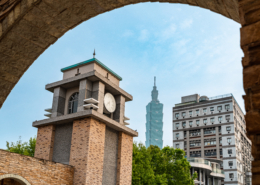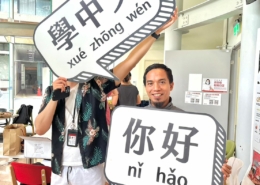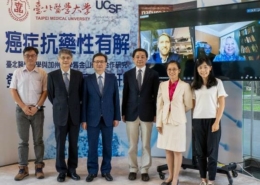TMU-NHRI researcher wins global awards for cancer breakthrough:
Alumnus finds mechanism justifying daily oral chemotherapies
 Dr. Kelvin Tsai is used to acclaim – a press release about his most recent paper inspired some twenty news stories published around the world, and he recently returned from accepting the Breast Journal Award from WISE Blackwell publishers at a Florida ceremony.
Dr. Kelvin Tsai is used to acclaim – a press release about his most recent paper inspired some twenty news stories published around the world, and he recently returned from accepting the Breast Journal Award from WISE Blackwell publishers at a Florida ceremony.
Yet he’s sorry that by his reckoning it took so long for the medical world to see the light. Some two decades after low-dose “metronomic” oral cancer meds were first found effective, less unpleasant and potentially much cheaper than injected chemotherapy agents, they’re finally being taken seriously — because Dr. Tsai discovered the “why” of their greater effectiveness.
TMU is where he received his medical training, but Dr. Tsai took a long road through Harvard and the University of California before returning to establish a joint TMU cancer lab that cooperates with his National Health Research Institutes (NHRI) team in Hsinchu.
In December’s Journal of Experimental Medicine, his team’s findings showed the previously unknown role of the stroma that surrounds and supports tumors. Dr. Tsai said this is often fibrotic tissue, like the lumps women check for in breast self-exams.
Such inflammation can be a sign of cancer – but since, as he said, “you can’t palpate a pancreas,” other diagnostic imaging can be used to reveal this larger “ecosystem of cancer” beyond the tumor itself.
Five years ago, he began researching stromatic changes in mice, studying cancer stem cells and immune cells during conventional “maximum tolerated dose” (MTD) chemotherapy. He watched the dramatic expansion of cancer stem cells as macrophages become immunosuppressive between treatments, and levels of protective T cells (familiar as an index of HIV/AIDS progression) also fell between conventionally timed treatments as a result of “stromatic activation.”
These problems were reduced by low-dose metronomic treatments, with less resistance between cycles. Such oral medicines not only prolong lives and cut costs, but also are tolerated more easily by patients, who no longer have the prospect of debilitating reactions after intravenously infused medications at longer intervals – because the “maximum tolerated dose” is frequently unpleasant or even dangerous for patients.
Dr. Tsai was quite candid about the “conservative” bias of the pharmacological establishment keeping this alternative out of reach for twenty years after metronomic treatment was proposed. After all, the conventional patents they hold are big money-makers, so for that reason they prefer injectable drugs. As a result, he said, most oral medications are being developed in Asia, not by the Big Pharma companies of the West.
His colleague Dr. Nicholas Andre from Marseille in France calls this an “equity issue” and has founded a global initiative to promote these alternatives. Dr. Tsai was invited to serve as an ambassador for this effort, but said that because “this [advocacy] is not science,” he prefers to continue to promote the metronomic concept with research instead.
Also on his TMU team is Dr Jorge Tze-Sian Chan, a Wanfang Hospital GI oncologist, and three laboratory researchers. Meanwhile, his ten-year collaboration with the University of California-San Francisco continues to yield important research, such as a paper on stem cells three years ago — and one that he said “is going to be huge” later this year.
After returning to his alma mater, Dr. Tsai continues working with his longtime lab in Hsinchu, and his team on campus Skypes regularly with both San Francisco and Zhunan, where a larger team manages his studies that involve animals and different equipment. Plans are ready for TMU to build a new state-of-the-art new Cancer Research Center , which in due course will better support Dr. Tsai’s ambition in combating cancer.
Dr. Tsai received his medical degree at TMU until leaving for complete clinical training at Veterans General Hospital in 1993, then went further toward research with a Harvard five-year Ph.D. scholarship and postdoc research in San Francisco. Dr. Tsai most recently ran a lab and clinical trials at the National Health Research Institutes in southern Taiwan, but his desire to give his own son the best educational choices ultimately convinced him to move back to Taipei.
Now that the mechanism supporting metronomic chemotherapy has been found, his next task is to demonstrate its efficacy, or how much better it works.
A huge multicenter clinical trial will be led by TMU and use an oral drug from a Taiwan company that can be used for a new metronomic chemotherapy regimen in the treatment of various types of solid cancers. And eventually, millions of cancer patients around the world can look forward to an affordable pill daily, instead of agonizing weekly infusions of a “maximum tolerable dose” of less-effective cancer drugs.
For interviews or a copy of the paper, contact Office of Global Engagement via global.initiatives@tmu.edu.tw.


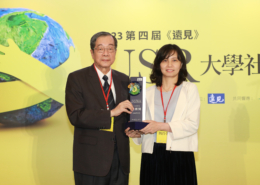
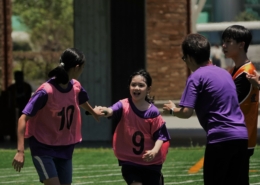
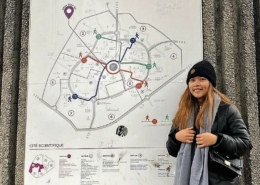

期許永續發展成為醫療產業新契機。-260x185.jpg)
